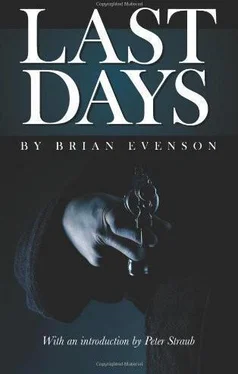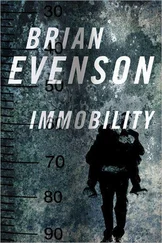"So we haven't managed to kill you after all, Mr. Kline," said Borchert. "Not, I must say, for lack of trying. You seem to live a charmed life."
"What happened to your eyes?" asked Kline.
Borchert smiled, the movement distorting his face terribly. "Always wanting to know, Mr. Kline. You'd think you'd have learned your lesson. Did you come here just to ask me that?"
"Not exactly," said Kline.
"Not exactly," said Borchert. "Always holding something back, Mr. Kline. Intimacy issues, perhaps?" And he smiled wider, the damaged skin just beside his mouth cracking, growing moist with a pinkish fluid in the cracks, leaking.
"What did you do with the girl?" asked Borchert. "Kill her?"
"No," said Kline. "Unconscious."
"Ah," said Borchert. "Still pretending to be human, are we?" Kline watched his smile tighten further, then slowly die. "Where were we?" he asked.
"Your eyes," said Kline.
"I thought we'd sidled our way past that," said Borchert. "What happened to my eyes, Mr. Kline, was you. You are also what happened to my face, my body, my voice. And now I imagine you've come to finish the job."
"Yes," said Kline.
"I don't suppose you could be convinced to give this one a pass?"
"I don't suppose so," said Kline.
"Say I call off the hunt, Mr. Kline? Say I solemnly swear not to pursue you, grant you immunity as it were?"
Kline hesitated.
"No," he said finally. "I can't trust you."
"I hear the hesitation in your voice, Mr. Kline. Why not give in to it?"
Should I? he wondered. And then he thought of each of the men he had killed, seven, unless it was eight, unless it was nine, the way they had each fallen. What did he owe them, now that he was here? Owe them? he thought. No, that was just him pretending to be human again. He didn't owe them anything. But they were a part of a velocity that still carried him forward and he didn't know how to stop without killing Borchert.
"Well, Mr. Kline?" said Borchert. "How about it?"
But then Kline caught out of the corner of his eye the nurse, still pretending to be unconscious, slowly lifting something out of the seat of her wheelchair, and he realized with a start that it was a gun. As she suddenly came alive and tried to turn it toward him he shot her twice in the head.
Borchert sighed in the bed. "I see you found her gun. Worth a try," he said. And then said, still inflectionless, "Hardly gentlemanly to shoot a lady. You could have simply disarmed her, Mr. Kline. What's happening to you?"
What indeed? wondered Kline.
"Well," said Borchert, "what are we waiting for? Get it over with."
"Not quite yet," said Kline.
"Not yet?" said Borchert.
"First," said Kline, "there are a few things I want to know."
Borchert smiled again, this time so wide Kline thought fleetingly his face was coming asunder. "Ah, Mr. Kline," he said. "We never seem to learn, do we."

"Shall we say twenty questions, Mr. Kline?"
"What?" said Kline.
"Nineteen questions then?" said Borchert. "And then you can kill me?"
"Suits me," said Kline.
"Always game for a game, Mr. Kline? But what am I to receive for my cooperation? Perhaps my life?"
"No," said Kline.
"Not my life? Then what, Mr. Kline? What's my so-called motivation?"
"Your motivation?"
"Eighteen," said Borchert. "You should be more careful. Simply this: Why should I answer your questions? I'm dead either way."
"True," said Kline.
"Perhaps. ." said Borchert. "It's not much, but perhaps I might be allowed to choose the manner of my own death?"
The nurse, Kline noticed, was apparently still alive, her hand quivering against the floor and sending ripples through the pooling blood. He went over to her, prodded her with his foot, turned her face up. She seemed dead, except for her eye, which, unblinking, followed each of his movements.
"Well, Mr. Kline?"
"What about paralysis?" asked Kline.
"Excuse me?" said Borchert. "Seventeen."
He moved his hand slowly, the gun in it, watched her eye follow it. Was there any sign of intelligence in the eye's movement? In the eye itself? Was she still human? More human than he?
"Have I lost you, Mr. Kline?"
"No," said Kline. "I'm right here."
"What are you doing over there?"
"Nothing," said Kline, watching the nurse's eye. "What about paralysis? Does it count the same as amputation?"
"Sixteen and fifteen, Mr. Kline. Is it religious instruction you're hoping for? Paralysis is a shadow and a type of amputation, a next best thing. We do not accept paralytics among us, but we look kindly on them. You have to draw the line somewhere, Mr. Kline."
"I see," said Kline. He watched the eye until he couldn't bear it anymore and then struck her hard on the forehead with the pistol. Immediately the pupil rolled back and was gone.
"But we have yet to reach an agreement, Mr. Kline, and you've already expended a quarter of your questions. I must ask again: Will I be allowed to choose the manner of my own death?"
"Within reason," said Kline, turning back toward him.
"Something quickly achieved, within this room, no tricks? Can we agree to that?"
"What is it?"
"Fourteen," said Borchert. "There's that curiosity again, Mr. Kline. Shall we say I'll tell you at the end? Once you've had your other answers?"
Kline thought. "All right," he finally said.
"Fine," said Borchert, "just fine. What would you like to know?"
"Tell me about Paul," said Kline.
"That's not a question," said Borchert. "Shall we rephrase it as Will you please tell me about Paul? Thirteen." He smiled again. "Ah, Paul," he said. "I knew he was behind this. Paul used to number himself among the faithful, Mr. Kline. Now he numbers himself among the fallen."
"What is he like?"
"Twelve," said Borchert.
"That shouldn't count as twelve," said Kline. "It's the same question."
"It's a modification of the original question," said Borchert, " ergo , no longer the same question. Twelve." Borchert stretched slightly. A plate of pink skin under one arm split, began to suppurate a yellowish substance. "Paul likes exactness and order. He wants everything to be the same. He's a great believer in the saving power of art and culture and, perhaps as a consequence, of the saving gestures of ritual. He's into the ritual of the worship-relics, ceremonies."
"Can I trust him?"
Borchert gave a barking laugh. "You should know better than to ask a question like that. Particularly of me. Who's to say if anyone can be trusted, Mr. Kline? Eleven."
"When I kill you, what will they do?"
"They Pauls or they us?"
"Both."
"That's two questions, Mr. Kline. Ten, nine. What we'll do is convene and decide on a new leader. What they'll do is rejoice at my death. I'm sure they have plans for you."
"What sort of plans?"
"Let's suspend that question for now," said Borchert. "Let's work our way toward that one."
"Who will take your place?"
"Eight. Our process is very simple, Mr. Kline. They'll opt for the person with the most amputations. In case of same number of amputations, one must rely on charisma and Godly vision. It could be either of two men whose rooms are to be found on this floor, at this end of the hall."
"And after them?"
"After them, Mr. Kline? One of the three other men on this floor. Seven."
"And after that?"
"Six. Not very original questions, Mr. Kline. You don't know how to play properly. After that, the next floor down. And then, after that, the ground floor. Then outside and to the nines, among which probably chief among them would be your former associate, Mr. Ramse."
"I thought he was an eight," said Kline.
Читать дальше













